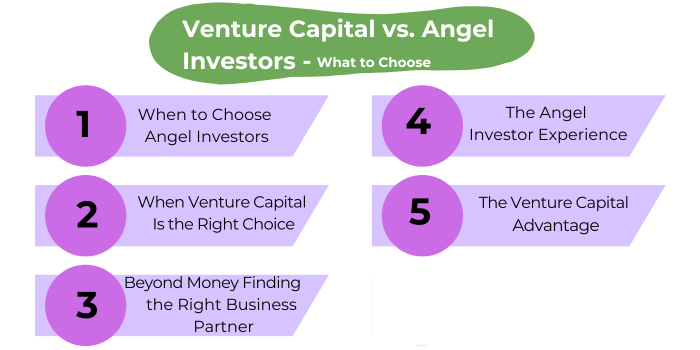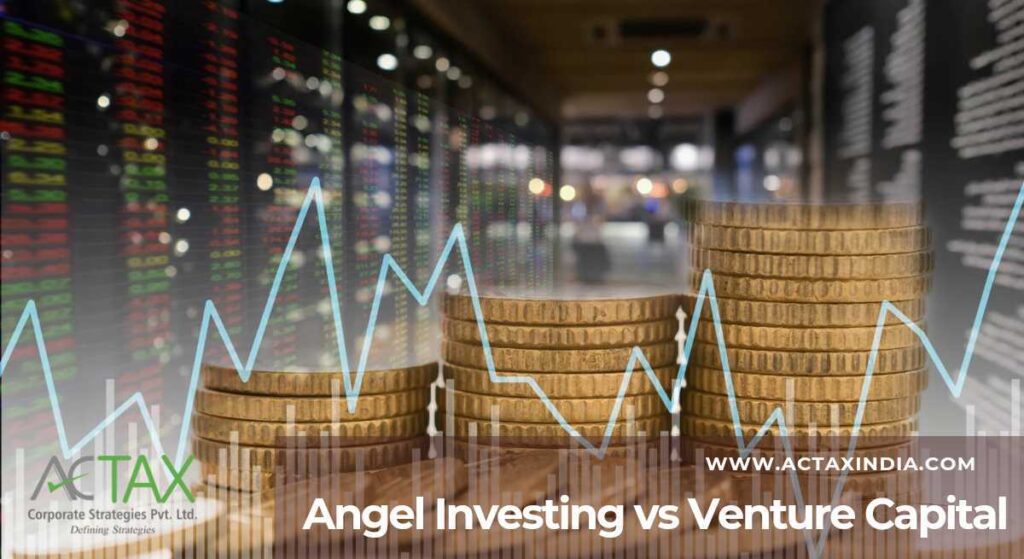Hello, startup enthusiasts! Let’s dive into the world of startup funding and unpack the difference between venture capital and angel investor. If you’re an entrepreneur looking to fund your brilliant idea, you’ve probably heard these terms thrown around. But what do they really mean, and which one is right for you? Let’s break it down
Table of Contents
Understanding the Difference Between Angel Investors and Venture Capital
Angel Investors: Your Startup’s Fairy Godparents
First up, angel investors. Think of them as the fairy godparents of your startup. These are usually accomplished business people who put their own cash on the line to fund startup firms. It is not all about the cash – most angels want to see young entrepreneurs prosper.
What Makes Angel Investors Tick?
What really drives an angel investor? Well, they normally invest lesser amounts, from a few thousand to a couple million dollars. They are usually the first to buy into your vision when all you have is the vision. And here’s the exciting part – many angels prefer to roll up their sleeves. They will guide you, introduce you to their contacts, provide advice, and show you opportunities. That is like having an experienced co-pilot when starting out on your business venture also refer to this blog startup India registration
Venture Capital: Enter the Dragons
Alright, let’s get down to business and discuss VC or venture capital. If angel investors are our fairy godparents, think of VCs as the dragons on “Dragon’s Den” or “Shark Tank” – but, friendlier! VCs are professional investors who are entrusted with sourcing and managing funds on behalf of several parties. They are on the hunt for the next big thing and aren’t afraid to spend huge amounts of money on it.
When Do VCs Come Into Play?
VCs are usually engaged when the startup has achieved some growth and has potential for more. You have your product in hand, possibly some clients, and you’re itching to step on the gas. They can invest large sums of money into your business – we are talking about millions and sometimes even hundreds of millions. However, caution should be taken for great funding attracts great responsibility and expectation.
The Great Divide: difference between venture capital and angel investor
So, what’s the real difference between venture capital and angel investor? Let’s break it down:
- Show me the money: Angels use their own cash, while VCs are playing with other people’s money.
- Timing is everything: Angels are often your first believers, jumping in at the seed stage. VCs usually wait until you’ve got some traction.
- Size matters: Angels typically invest smaller amounts, while VCs can write much bigger checks.
- Decision time: Angels can often make decisions quickly, sometimes over a coffee. VCs? Well, get ready for a more formal, sometimes lengthy process.
- Hands-on or hands-off: Many angels love to roll up their sleeves and get involved. VCs might offer strategic guidance but are less likely to be in the trenches with you.
The Pros and Cons of Angel Investors & Venture Capital
Angel Investors: The Good and The Bad
Angel investors can be great because they offer a lot of freedom and are fast at making decisions. Need money fast? Perhaps an angel would do the trick. They very often come with valuable experience and contacts as well. But there are downsides. The cash they can bring in is small, and they may want a big piece of your company in return for their money.
Venture Capital: The Upsides and Downsides
Venture capital, on the other hand, can provide a massive cash injection to fuel rapid growth. They come with a treasure trove of resources and can really boost your startup’s credibility. But be prepared to give up some control. VCs expect big returns and might push for aggressive growth strategies that could make you a bit uncomfortable.
Choosing Your Path: the difference between venture capital and angel investor

When Angels Might Be Your Best Bet
- You’re just starting out and need seed funding.
- You value hands-on mentorship from experienced entrepreneurs.
- You need funding quickly without a long due diligence process.
- Your capital needs are relatively small.
When to Consider Venture Capital
- You’ve proven your concept and need substantial funds to scale.
- You’re looking for strategic support beyond just money.
- Your funding needs are in the millions.
- You want the credibility boost that comes with VC backing.
Beyond the Money: Finding the Right Partner
Okay, time to be serious, the difference between venture capital and angel investor is not only about the money but about choosing the right approach for your business. It is about how one can connect with the right co-founder for the startup’s crazy ride. It’s sort of like dating, there is one person out there who will understand you and your goals.
The Angel Experience
On the angel’s side, you can find some who have been through the same phase in their growing and can help you throughout. They might be more forgiving of the highs and lows of the startup game. But remember, they are risking their own money, so they will expect their money to earn something in return.
The VC Perspective
VCs on the other hand can provide a rocket-like boost to your growth. They have the capital and relevant network to take you to the next level. But be ready for a more business-like atmosphere. They are real players in the market who have a function to perform – to make money for their fund. This can also lead to more demands to expand rapidly and achieve giant leaps.
Pro Tips for Choosing Investors
Here’s a tip: do not just focus solely on the money. Seek out investors who are more than just ‘writing checks’. Are they experienced in your field of work? Can they refer you to potential customers or partners? Are their values relative to your values?
Moreover, consider your goals for the future. Do you want to develop a long-term enterprise, or are you planning for growth and scalability as well as an eventual sale? Your answer may determine what you think of the difference between venture capital and angel investors.
Thinking Outside the Box: Alternative Funding Options
As was stated above, funding is not a panacea and it should be used wisely. It is common for many young companies to employ a combination of funding methods as they expand. It is quite common to use angel investors for seed funding and then transition to a VC as you grow.
And here’s something that often gets overlooked: in some cases, the best funding source might not be investors at all. Based on the nature of your business, you may be able to bootstrap with the help of the first customers or involve crowdfunding or grants.
Here comes the end!
In the end, you must have a clear idea of the difference between venture capital and angel investors, now it’s all up to you whether you choose angel investors or venture capital, make sure that your choice is aligned with your vision. Each of these paths has its strengths so just decide which path would fit your startup best. Again, bear in mind that it is not just about the funds, but identifying who can be the right partner for your business venture. Remember your dream and let your start-up fly high!







